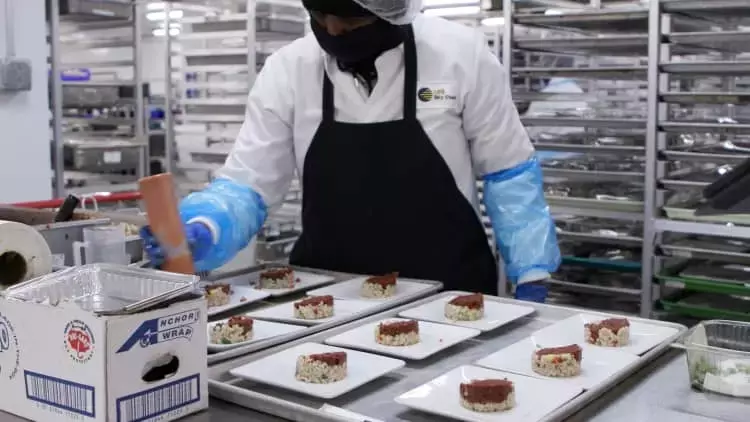
The incident highlights the delicate nature of in-flight catering, where airlines must ensure the safety and quality of thousands of meals served daily. While such incidents are rare, they can have significant consequences, both for the airline's reputation and the well-being of its passengers. Delta's swift action to limit meal options demonstrates its commitment to prioritizing food safety and minimizing the risk of any further incidents.
One of the key challenges facing airlines is the sheer volume of meals that must be prepared and delivered to aircraft on a daily basis. With thousands of flights taking off and landing around the world, the demand for in-flight catering is immense. This requires a well-coordinated effort between airlines, catering companies, and suppliers to ensure that the right meals are delivered to the right aircraft at the right time.
Additionally, the unique environment of an aircraft cabin, with its limited space and fluctuating temperatures, can pose additional challenges for maintaining food quality and safety. Airlines must carefully monitor the storage, preparation, and handling of in-flight meals to mitigate the risk of contamination or spoilage.
A strike at Gate Gourmet, which caters for Delta at 19 domestic stations, could have significant implications for the airline's operations. Delta has acknowledged the potential disruption and is reviewing strategies to limit the impact on its customers and operations should an interruption occur.
The prospect of a catering strike highlights the delicate balance that airlines must maintain between providing a seamless passenger experience and ensuring the reliability of their supply chain. A disruption in catering services could lead to flight delays, cancellations, and a deterioration of the overall passenger experience, further compounding the challenges faced by the industry.
In the face of potential catering disruptions and food safety concerns, airlines must be vigilant and ready to implement such proactive measures. By anticipating and addressing potential issues before they escalate, airlines can minimize the impact on their operations and maintain the trust of their customers.
As the airline industry navigates the complexities of in-flight catering, Delta's actions serve as a reminder of the importance of maintaining a robust and resilient supply chain, as well as a steadfast commitment to food safety and passenger satisfaction. In an industry where every detail matters, airlines must continue to prioritize these critical aspects of their operations to ensure a seamless and enjoyable travel experience for all.

6 Sustainable and Healthy Fish to Eat (And 4 Types to Avoid)
Here's the scoop on the best sustainable and healthy fish to eat regularly according to experts and a few fish types they recommend you avoid.
16 Pumpkin Pie Recipes to Make for Thanksgiving
From traditional pumpkin pie recipes to elegant and creative variations (such as pumpkin pie pudding, cheesecake, and cupcakes), these scrumptious pumpkin pies will make your Thanksgiving holiday dessert a smashing success.
14 Easy Slow Cooker Appetizers that Make Entertaining Low Stress
These holiday slow cooker appetizers will hit the spot for every guest. Our recipes include sliders, dips, fondue, and more!
Godzilla Roll Sushi Bake
This sushi bake recipe makes your favorite sushi roll a breeze to make. Get the delicious taste with half the work by following our Godzilla Roll Sushi Bake recipe.
Indian Masala Chili
Indian Masala Chili
How to Make a Smoothie from Your Favorite Fresh Ingredients
Learn how to make a smoothie with your favorite fruits, veggies, and dairy or non-dairy products. Skip the pricey juice bar or bottled options.
Make-Ahead Mini Cheese Balls
Once you learn how to make cheese balls that you can customize—and then freeze for up to three months—you'll never host a party without them! Depending on which cheese ball seasoning you choose, this make-ahead cheese ball recipe can fit any season or color palette.
Eggplant "Meat" Balls with Chimichurri
Enjoy these plant-based meatballs for your next meatless dinner.
Slow Cooker Italian Sausage Grinders
Make hot Italian sausage subs for a crowd with this easy slow cooker sandwich recipe. This easy Italian sandwich recipe makes enough meat for 12 subs, so it's great for a party or potluck.
Low-Sugar Chocolate Chip Zucchini Muffins
Enjoy these moist healthy muffins for breakfast or with your afternoon tea.
How an Orchestra Orchestrates a Live Journey Through a Video Game
A controller will direct a conductor's baton during Journey's live performances at the Brooklyn Acad
Fashion and Beauty: 3 Hottest summer nail colours
This article discusses the latest nail color trends for the summer season. It highlights three popul
Marni SS25 Collection: A Story of Fashion and Beauty
The article explores how the "hero's journey" narrative structure is reflected in Marni's SS25 colle
Victoria’s Secret Fashion Show 2024 Makeup-Free Backstage Beauty With Tyra Banks & More Models
The 2024 Victoria's Secret Fashion Show is making a highly anticipated return to New York City, feat
5 Video Games Based On Hit TV Shows
The article discusses the cross-pollination between entertainment mediums, focusing on the trend of
“Classic part of the game”: GTA 6 Fans Worry as They’ve Not Seen 1 Iconic Part of the Grand Theft Auto Franchise Yet, While Others Hope It’s Cut
The article discusses the hype surrounding the highly anticipated Grand Theft Auto VI (GTA 6) and th
Spies, breakups and thick glasses: Philly’s Pig Iron obsesses over Aimee Mann in ‘Poor Judge
The article discusses a new theatrical production called "Poor Judge" by Pig Iron Theatre, which is
Weekend Entertainment Highlights: Lizzo, Diddy & More (November 30, 2024)
This text presents various news. Lizzo is on a weight loss journey and shows off her slimmer figure.
Skyline Chili voted ‘Best Regional Fast Food’ in US, according to new poll
Skyline Chili, a beloved Cincinnati-based fast food chain, has been named the "Best Regional Fast Fo
Governor Gianforte Launches 4th State Agency Food Drive on 5th Day of Giving
The Governor's Office announced the fourth annual state agency food drive competition on December 6,